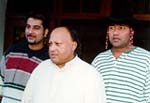'I don't know what to do with Anu Malik'
Suparn Verma
 In Bombay, the Shiv Sena will not allow him to perform or record music, in protest against the Pakistani ban on Indian
artistes. It is an attitude which deeply confuses Ustad Nusrat Fateh Ali Khan, a simple man whose art knows no national borders.
In Bombay, the Shiv Sena will not allow him to perform or record music, in protest against the Pakistani ban on Indian
artistes. It is an attitude which deeply confuses Ustad Nusrat Fateh Ali Khan, a simple man whose art knows no national borders.
Suparn Verma met the international superstar on his last visit to Bombay.
At first glance, the man who has taken the music world by storm in recent times
looks more like a Sumo wrestler than Sufi singer.
Spend time with him, though, and you realise that whatever else Ustad Nusrat Fateh Ali Khan is capable of being,
one thing he could never be is violent. A monumental calm characterises his periods of repose,
and every movement of his hands -- whether to underscore a melody as he sings, or to underline a
point as he speaks -- is infinitely gentle.
That same monumental calm characterises his speech patterns -- words are sought for, tasted on
his tongue, and then delivered with due precision -- even when he speaks of his passion,
his junoon, for music.
We meet him after the Ustad of Sufiya Kalaam has spent an all-nighter with lyricist Javed Akhtar, composing
songs for the under-production album Kaache Dhaage. "Asian music," he says in his trademark
thin, reedy voice, "has a depth and a stability which even the western audiences understand. The reason for that is,
my qawaali is so powerful that it reaches out to you. That's also the reason why the biggest singers
in the world want to collaborate with me. Yes, there is definitely going to be a rise in the demand for Asian music."
He doesn't say so in as many words, but the implication is clear -- it is Nusrat Fateh Ali
himself who is fuelling this newfound interest in, and demand for, Asian music.
The Ustad's pedigree would do a Boston Brahmin proud, stretching back as it does for
all of 600 unbroken years. Nusrat Fateh Ali Khan belongs to the Qawwal-Bachon Gharana, a
tradition which specialises
in two classical streams -- dhrupad and khayal.
Interestingly, he may end up being not only the highwater mark of this line,
but also its end -- his only child is a daughter and, under the canons of Islamic law, she is forbidden from practising the art that has made her father a figure famed throughout the world.
"My daughter is 13 years old, but girls cannot
sing professionally as it is not allowed in the precepts of the Islamic culture," the Ustad agrees. "Sufi music has those restrictions. Though she does sing at home, she cannot sing qawaali professionally. So my daughter might end up becoming a doctor or an engineer," he says, that trademark smile creasing his cherubic features.
 Equally interestingly, he almost didn't make it to the pantheon of singing greats -- if his father, Ustad Fateh Ali Khan, had had his way, Nusrat would have become a doctor.
But then, fate intervened, in the form of a dream.
Equally interestingly, he almost didn't make it to the pantheon of singing greats -- if his father, Ustad Fateh Ali Khan, had had his way, Nusrat would have become a doctor.
But then, fate intervened, in the form of a dream.
"The dream occurred to me sometime in 1964," recalls the singer. "I must have been 12-13 years old at that time, I never used to
sing before that, although I did play the tabla. I had this recurring dream that I was singing in the holy dargah of Moin-ud-din- Chisti in Ajmer. After that dream, I became obsessed with singing and finally, even my father had to relent."
Among those who have had occasion to bless that particular dream are a bevy of Bollywood music composers, who have been routinely 'inspired' by the famed qawaal's songs. The Ustad for his part accepts the rip-offs with a fatalistic shrug.
 His phlegmatic tolerance, however, stretches thin when Anu Malik's name comes up. "What Anu Malik has done is too much," he protests. "This is just not the done
thing, he has taken my devotional song Allahu and converted it into I love you. He should at least respect my religious songs." His phlegmatic tolerance, however, stretches thin when Anu Malik's name comes up. "What Anu Malik has done is too much," he protests. "This is just not the done
thing, he has taken my devotional song Allahu and converted it into I love you. He should at least respect my religious songs."
The comment brings up the obvious question -- who does he regard as talented among today's music composers? "India has a lot of talented music composers," he says. "There is A R Rahman who
is very good, Nadeem Sharavan, Anu Malik -- no I'm not joking,
he is a very talented composer, but he has lost his direction
somewhere along the way. He could have gone far ahead in life,
but there is a lot of the commercialisation in music industry
today, the producers force him to do it, to copy other songs. That way a man's credit
gets lost. If one is dedicated to his work he can go far ahead
in life. I don't know what to do with him, every time we meet
he says that he loves my music so much that when he lifts my tunes he is actually showing me his admiration. But what he has done with Allahu by making it into I love you
is the limit. I do plan to do something about it, let's leave it
at that for now."
Interestingly, Anu Malik will team with the Ustad and Bally Sagoo
to compose for Firoz Nadiadwala's under-production film, Kartoos. And Nadiadwala makes no secret of the fact that it is the Ustad himself who will be
in total command of the troika.
"Firoz is a good friend of mine," says the Ustad, "and he had
approached me when I was in Los Angeles. But I was very busy at
that time, so I accepted to do only four songs of his film Kartoos.
But I am the one who is in full charge of the entire music," he adds, grimly.
Continued...
|







